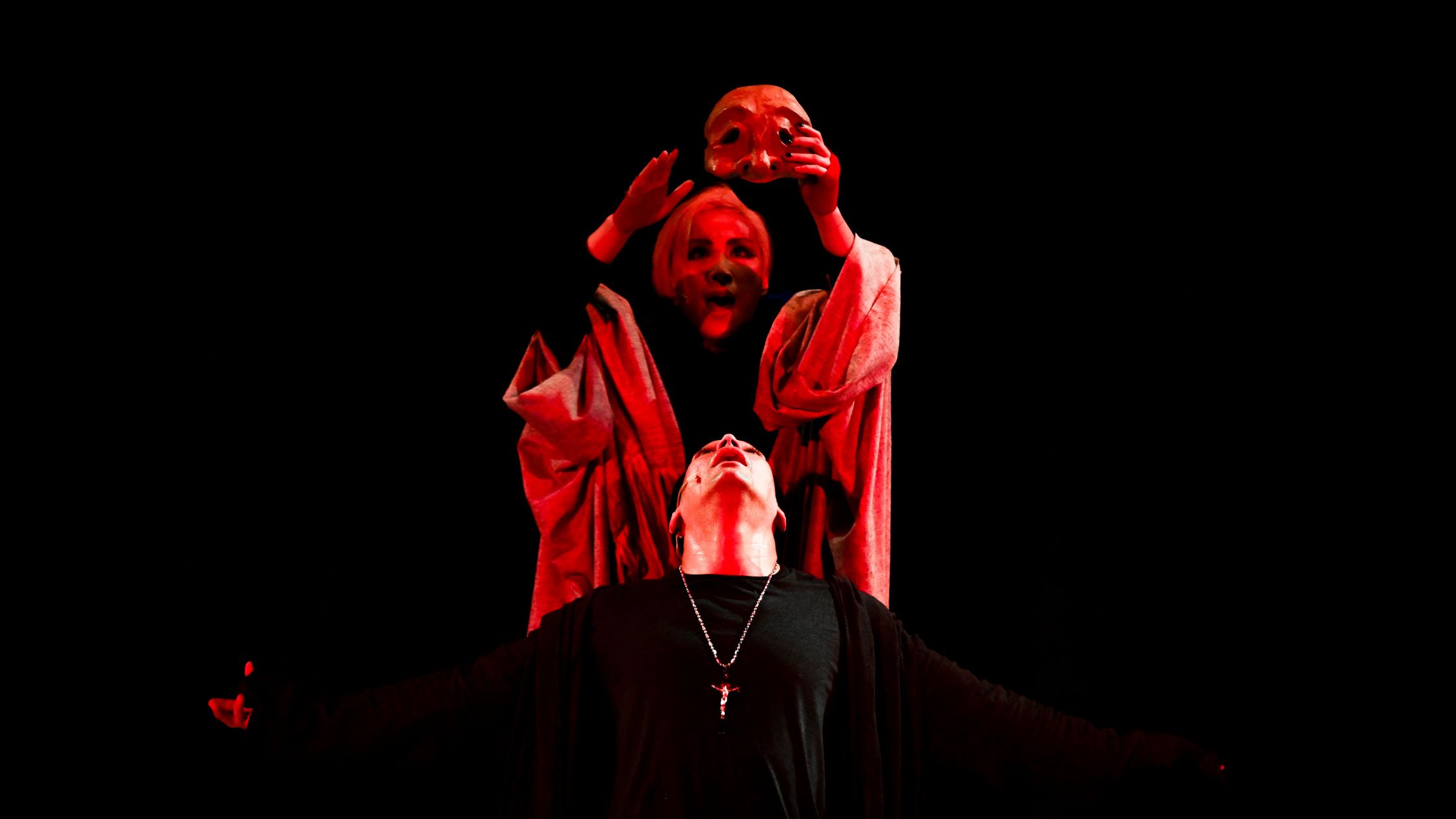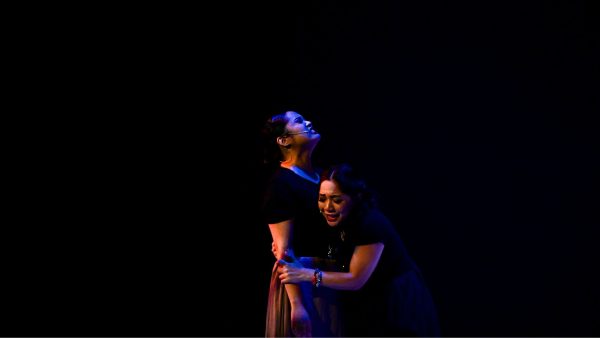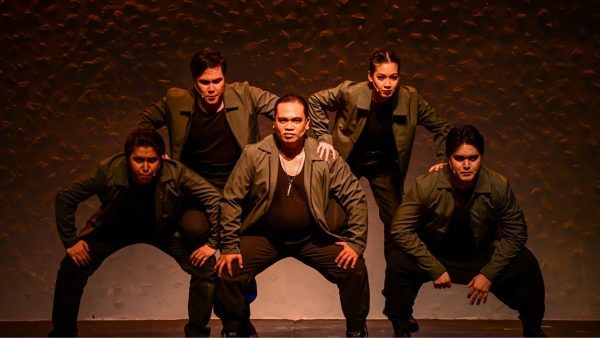
REVIEW: ‘Si Faust’ is a thrilling, unholy marriage of theater and heavy metal
There’s something about the earnestness of musical theater and the intensity of heavy metal that makes them seem diametrically opposed, or at least difficult to blend without diluting them. But through its own audacious, go-for-broke methods of madness, Areté’s Si Faust cranks up the drama inherent to both performance styles until the anguish of its characters and the viciousness of its music become one and the same.
Told entirely through the songs of Filipino rock band Wolfgang—orchestrated to the level of sweeping opera—this story of a preacher who is granted good fortune by the devil fully embraces a bold expressionist style and the staggering vocal abilities of its cast. By displaying an equal love for the stage and for heavier forms of music one seldom hears on stage, the resulting production becomes one of the most thrilling experiences of live theater in recent memory and one of the best shows of 2025.
Wall of Sound
Those familiar with Wolfgang shouldn’t be surprised by how much their music complements Johann Wolfgang von Goethe’s 19th-century play. Their unexpected mix of metal and folk rock already uses biblical and mythical imagery to capture both the human and the monstrous—and Kabaitan Bautista’s musical direction transforms the naturally rough, visceral delivery of ‘90s rock music into a gothic, all-consuming wall of sound. However, Bautista (who serves as sound designer as well) also understands that loudness shouldn’t be piercing but full. Even if some lyrics aren’t perfectly audible, the music makes no apologies for its volume, especially as its small ensemble fills up the score with what sounds like a hundred wailing souls.

L-R: Matel Patayon, Shaira Opsimar; Photo Credit: Kyle Venturillo
Given its nature as a sung-through rock opera with only several lines of dialogue throughout, Si Faust mostly goes by the broader strokes of Goethe’s script; the lyrics don’t always literally describe what occurs in the story. And yet, it isn’t challenging to latch on to where it goes: from the despair of Faust’s (Joseton Vergel de Dios) old life among the people he wishes to save, to Mephistopheles’ (Maita Ponce) various temptations towards youth and desire, to the tragedy that Faust inadvertently brings to the young provincial girl Marga (Shaira Opsimar). And with such little dialogue, the musical insists that we read it through the veil of Wolfgang’s songs. Any opaqueness in the storytelling only enhances the mythic feel of the music, like watching a classical painting come to life.
Express, Don’t Tell
But rather than depict this tale through ornate set design, the production’s expressionist aesthetic emerges instead from Sarah Facuri’s mostly bare stage and a rear platform separated by panels that shift in every direction—like the world revolving under the devil’s will. Jethro Nibaten’s stark lighting casts even the most personal brawls against a cosmic battle between evil and innocence, while Joyce Garcia’s video projections smartly accentuate the tone of different scenes without trying to become a flat substitute for tactile settings. Carlo Pagunaling’s simple costume design focuses on reds, blacks, and a grungy DIY look, but it’s his use of masks early in the show that make for the musical’s most striking images. Faust is established as, ultimately, aged and spiritually infirm, and Mephistopheles is but a fallen angel reduced into a jester.
Though the production’s sonic qualities draw much inspiration from the energy of metal concerts, Nelsito Gomez’s direction of his cast and what we see on stage is pure classical theater, expressed in the more pronounced gestures of silent cinema. And even if Jim Ferrer’s choreography often focuses on the thrashing of bodies over neatness, the movements still manage to fill up the stage, spilling over the edge and into the first row of the audience. Gomez and the show’s co-creator, Wolfgang frontman Basti Artadi, leap over the traps that tend to bog down many other Filipino jukebox musicals, achieving a coherence and a briskness of pace that can be very rare to find in theater.
Show Stoppers
Most crucial to the musical’s success, of course, is in finding performers who can fulfill the vocal demands of metal, and the entire ensemble here is beyond capable. Even those in smaller roles, such as Matel Patayon and Joshua Cabiladas, get opportunities to dig deep into the kind of human suffering that makes one blind to hope and reason. In the title role, Vergel de Dios doesn’t just faithfully capture Artadi’s tone but delivers everything with wide-eyed fear and disbelief. Vergel de Dios’ casting, in particular—together with the show’s deliberate use of English and Tagalog, and even the title’s Filipino phrasing (Si Faust rather than just Faust)—seems to emphasize the character’s status as a Western foreigner who, despite any good intentions, still ends up intruding into Filipino communities, invites chaos, and forces the survivors to pick up the pieces afterwards.

Clockwise: Iya Villanueva, MC dela Cruz, Joshua Cabiladas, Thor Ganchero, JV Fulgencio; Photo Credit: Kyle Venturillo
But perhaps the production’s most exciting revelation is Ponce, whose Mephistopheles explodes onto the stage as an ever-changing kaleidoscope of arrogant self-satisfaction, gleeful humor, and the terrifying, unblinking gaze of an alpha predator closing in on its prey. She is both wicked showman (not unlike Alan Cumming’s Cabaret Emcee) and seductive false prophet—with the charisma and vocal power to rival any longtime hard rock singer.
And solidifying her place as arguably our most skilled musical theater actress working today, Opsimar becomes the vessel for an entire country’s anguish under the rule of destructive foreign powers. The sheer breadth of her vocal range, from her mournful lower wails to her devastating crescendos—not to mention the agility and the emotion with which she slides from one end to the other—is the oasis of human decency in a musical already so adept at making darkness so exciting to lose oneself in.
Tickets: P999 – P1499
Show Dates: Nov 14–23 2025
Venue: Doreen Blackbox Theater, Areté, Ateneo de Manila University, Quezon City
Running Time: approximately 1 hour and 40 minutes (with a 15-minute intermission)
Creatives: Nelsito Gomez (Direction, Creator), Basti Artadi (Creator), Johann Wolfgang von Goethe (Playwright), Kabaitan Bautista (Musical Direction, Arrangement, Sound Design), Rafael Jimenez (Assistant Direction), Jim Ferrer (Choreography), Sarah Facuri (Set Design), Carlo Pagunaling (Costume Design), Jethro Nibaten (Lighting Design), Joyce Garcia (Video and Projection Design)
Cast: Joseton Vergel de Dios, Maita Ponce, Shaira Opsimar, Joshua Cabiladas, Matel Patayon, MC dela Cruz, Jam Binay, JV Fulgencio, Thor Ganchero, Iya Villanueva
Company: Areté Ateneo


Comments